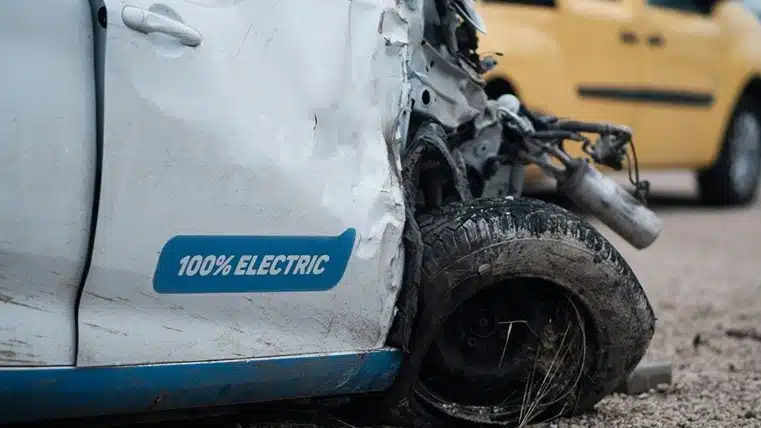In the Sunshine State, where the allure of the open road meets the push toward sustainable transportation, electric vehicles (EVs) are becoming an increasingly common sight. But as more Floridians switch to electric, questions arise about the safety of these vehicles in the event of an accident, particularly regarding what happens to electric car batteries in a crash. If you or a loved one were hurt in a crash that wasn’t your fault, reach out to our Florida car accident lawyers today.

The core of the matter: Electric car battery safety
At the heart of every electric vehicle is its battery, a powerhouse of stored electrical energy waiting to be unleashed. But what happens when the unexpected occurs and an EV is involved in a crash on Florida’s roads? Understanding the engineering behind these batteries is akin to knowing the safety features of a hurricane-proof home; it’s about preparation and resilience.
Crash impact on EV batteries
When an electric car meets with an accident, the immediate concern revolves around the battery’s integrity. Manufacturers design these batteries with robust protective measures, much like a spacecraft is shielded against the harshness of space. They’re encased in solid, puncture-resistant materials and often in the vehicle’s safest zones to minimize risk.
Potential risks and realities
Thermal runaway
One of the most cited risks in a crash is thermal runaway. This reaction can occur if a battery cell is damaged, leading to a rapid increase in temperature and potentially causing a fire. However, such incidents are rare, like dramatic but statistically unlikely lightning strikes.
Chemical leaks
Batteries contain chemicals that, if leaked, could pose hazards. Yet, the containment measures are designed to mitigate such leaks, like the levees and pumps designed to protect Florida’s coastal communities from flooding.
Florida’s response to EV accidents
In Florida, first responders are increasingly trained to deal with electric vehicle accidents, including potential battery fires. This specialized training ensures they can quickly and safely address issues, similar to how lifeguards are trained to rescue in calm and turbulent waters.
What happens after a crash?
Post-accident, the focus shifts to assessing and addressing any damage to the battery. The process is meticulous and involves the following steps.
Immediate assessment
As a doctor evaluates a patient, technicians will assess the battery’s condition to identify immediate risks.
Repair or replace
Depending on the damage, the battery may be repaired or replaced. This decision is crucial for the vehicle’s future safety and performance.
Recycling and disposal
Damaged batteries are handled carefully, recycled, or disposed of safely to avoid environmental hazards.
The role of a Florida EV accident lawyer
Navigating the aftermath of an EV accident in Florida requires technical know-how and legal expertise. A Florida EV accident lawyer can provide crucial guidance, from dealing with insurance claims to ensuring that product liabilities are addressed. They act as the navigator, helping you chart the best course through the legal system while focusing on your recovery and rights.
Charging ahead with confidence
As electric vehicles continue to populate Florida’s roads, understanding what happens to electric car batteries in a crash is essential for drivers, passengers, and the broader community. While the risks exist, the combination of advanced safety features, rigorous training for first responders, and the availability of legal support from firms like Lytal, Reiter, Smith, Ivey & Fronrath means that Floridians can embrace the shift to electric mobility with confidence, ready to explore the future of transportation under the Florida sun.



